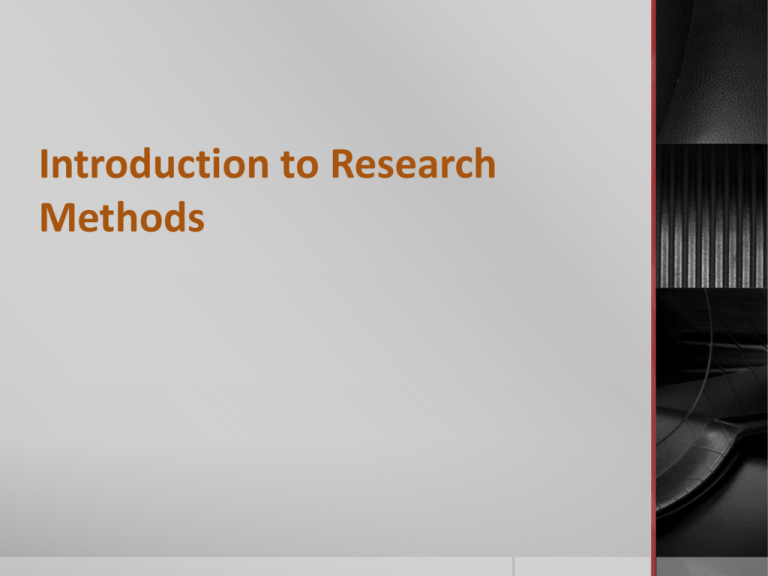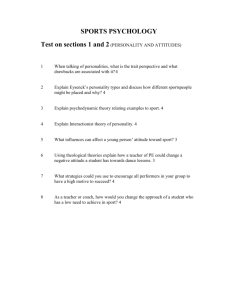Introduction to Research Methods
advertisement

Introduction to Research Methods Research Defined Systematic process of collecting and logically analyzing data for a purpose. Research methods – the methodology, how we do it. Levels of Research Basic Test theories Often in a lab setting May have limited direct applicability Not designed to solve social problems Theory – predicts & explains generalizable findings Levels of Research Applied Field & application oriented Less controlled setting Relies on a theoretical foundation, but not designed to test theory Evaluation Focused on a particular setting or practice Merit & worth of something Research vs. Evaluation RESEARCH EVALUATION Systematic Systematic Undertaken to establish facts & principles that contribute to a knowledge base Undertaken to address some criteria to make judgments about the worth of something Research vs. Evaluation RESEARCH Prove disprove hypothesis… EVALUATION Improvement in areas (ie. Personnel, programs, policies) Hypothesis Educated guess about the outcomes of a study SM= A Heisman trophy winner will positively impact ticket sales and donor contributions the following season. PE= The self-perception of female physical education pre-service teachers will include strong willed behavior, positive presentation and appearance, and aggressive and dominant behavior. RM= The more serious a triathlete is about the sport, the more likely they are to use negotiation strategies in order to participate as much as desired. Research vs. Evaluation RESEARCH EVALUATION New knowledge, may not be immediately applicable Problem solving & decision making Theory building Problem based Research vs. Evaluation RESEARCH EVALUATION Generalizability Not generalizable Published Used by the organization Variables Variables Any entity that can take on different values/varies IV = Manipulated, treatment DV = Effect of the IV, measured Cause (IV) & effect (DV) Variables INDEPENDENT (MANIPULATED) DEPENDENT (MEASURED) Physical activity levels Weight Televised games In game attendance Management style Use of ee rewards Game day experiences Attendance Daily PE BMI Types of Studies (3) Descriptive Describes what is going on & what exists Relational Relationship between 2 variables Causal Cause/effect a variable has on another Qual vs Quan QUANTITATIVE QUALITATIVE Analysis of numeric data Analysis of words, actions, objects Researcher uses tools, such as questionnaires or equipment to collect numerical data. Researcher is the data gathering instrument thru interviews, observations, documents Scientific Method 1. Developing the problem Topic of study, issue Variables SM: Use of social media=increase ticket sales PE: Increased time in daily PE=decreased obesity rates RM: Increased presence in parks=decreased criminal activity Scientific Method 2. Formulating the hypothesis Expected results Rely on experience & the literature Study either supports or refutes hypothesis 3. Gathering the data Process/methodology Instruments Data gathering process Scientific Method 4. Analyzing & interpreting the results Statistics Comparisons Dissemination of results Content of a Research Article (7) Abstract Short summary paragraph @ 150 words Content of a Research Article (7) Introduction Put study into context Overview of topic Significance to profession/relevance Research ?’s at end of intro… find them in your article Review of literature Summarizes & analyzes previous research Theoretical framework Content of a Research Article (7) Research hypothesis or question (if applicable to journal) Results Stats, tables, analysis Content of a Research Article (7) Discussions, implications & conclusions What was learned How results relate to previous research Impact on profession Any unusual results Future research… find them in your article Generalizability References What is a Research Problem? Research Problem Issue, controversy, or concern that initiates the study What level of tickets are most impacted by a winning football season? How does social media impact athletic event attendance? What is a Research Problem? Examples… What percentage of the daily threshold (12,000 steps) PE class and recess contribute to 6th grade students overall daily PA. What are the biggest motivations and/or reasons why students attend home athletic contests? To determine if a certain Myers-Briggs personality type is more successful selling tickets in Major League Baseball I Need a Problem! Personal experience & supervisor Talk with your advisor Look at the literature I Need a Problem! Choose something… Of interest Feasible Not too broad Not too technical Impacts the profession Online list… I Need a Problem! 3 criteria for a good problem Problem can be researched Requires more than a yes/no answer Information can be gathered for some type of analysis Purpose of the Study Purpose statement One sentence stating what the study is investigating Allows reader to quickly identify what the study is about Usually found at the end of the introduction or the first paragraph Examples… Purpose of the Study The purpose of this study was to explore luxury suite ownership in professional sports and to provide suite sales and facility management professionals an increased understanding of luxury suite ownership The purpose of this study was to determine an overall competency framework that can be used for parks and recreation boards regardless of whether they are independent, semi-independent, or advisory in nature. The purpose of the study was to examine first year physical education teachers’ perceptions of levels of support provided by their trained mentors. Research Question(s) More clearly define the research problem Focus the study Relationship to the hypothesis… The purpose of this study is to determine if personality type of sport sales professionals impacts job success. RQ #1: What personality type is most successful among sport sales professionals? Hy. #1: X personality type is most successful among sport sales professionals RQ #2: What personality type is least successful among sport sales professionals? Hy. #2: Y personality type is least successful among sport sales professionals? RQ #3: What aspects of a personality type enhances the success of a sport sales professional? Hy. #3: XYZ aspects of a personality type enhance the success of a sport sales professional The purpose of this study is to determine if personality type of sport sales professionals impacts job success. Null Hypothesis There is no difference in personality types among successful sports sales professionals. No one personality type determines success in sport sales professionals.




